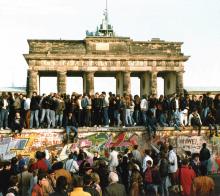Tuning In
Diasporic Contact Zones at the BBC World Service

You are here
- Home
- Cold War Politics and BBC World Service
Cold War Politics and BBC World Service

The Cultures of Diplomacy theme has paid particular attention to “critical events” in the history of the World Service alongside an analysis of current developments in international communication strategies. In this regard, the examination of Bush House’s reporting of the rise of Polish Solidarity in the early 1980s has been revealing not only in its own terms, but also as a historical counter-point to contemporary machinery of public diplomacy.
Coming to terms with Cold War broadcasting was a defining experience for the BBC World Service and its language services to Central and Eastern Europe. Staff working in these Section’s (and subsequent generations of dissident broadcasters) found themselves in a peculiarly instrumental position as they broadcast news of the outside world through the Iron Curtain to audiences with whom they shared a common heritage. For the Polish Section of the BBC, the path of Solidarity cemented the importance of this diasporic link with London at a moment of acute international tension.
Research Aims:
a) To reveal, on the basis of archival and interview research, the story of the BBC’s reporting of the rise of Polish Solidarity
b) To contextualise the experience and significance of BBC Polish Section staff as diasporic broadcasters and agents of influence in this period
Research Questions:
1. What was the impact of BBC reporting on the comprehension of events in Poland on both Polish audiences and wider international sentiment?
2. To what extent did factors such as generational change within the BBC Polish Section and the personal attitudes of Polish staff affect working practices within Bush House and the reporting of Solidarity?
3. How did the BBC Polish Section staff, as a distinct diasporic group, relate to the wider Polish community in Britain and the international diaspora?
Project contact:
Dr. Alban Webb, The Open University, a.j.webb@open.ac.uk
Dr Alban Webb is a Research Fellow in Sociology at the Open University, working as part of the ESRC Centre for Research on Socio-Cultural Change (CRESC). His previous research as a historian has focused on Cold War Britain, examining the UK’s nuclear deterrence strategy, intelligence services and civil defence planning. His book on the BBC World Service, London Calling: BBC External Services and the Cold War, will be published in 2011. His latest research, on the roles of public and cultural diplomacy in the context of international relations (most recently as part of the AHRC-funded Tuning In: Diasporic Contact Zones at the BBC World Service project) forms the basis of his ongoing examination of the changing Cultures of Diplomacy at work in British overseas communication strategies.
Marie Gillespie is Professor of Sociology at the Open University and the Principal Investigator on Tuning In. She is Director of media research ESRC Centre for Research on Socio-Cultural Change (CRESC). Her research interests focus on the political, socio-cultural and economic implications of migrant transnationalism, especially in relation to the South Asian diaspora. Recent Open University teaching texts include an edited volume Media Audiences (2005) and Analysing Media Texts (2006). Recent research projects include: an audience ethnography of media coverage of the attacks of 9/11/2001 (http://afterseptember11.tv); a study on transnational news cultures and the politics of security (Mediating Security). Her publications include a monograph entitled Television, Ethnicity and Cultural Change (Routledge, 1995).
Project members:
- Cultures of Diplomacy

